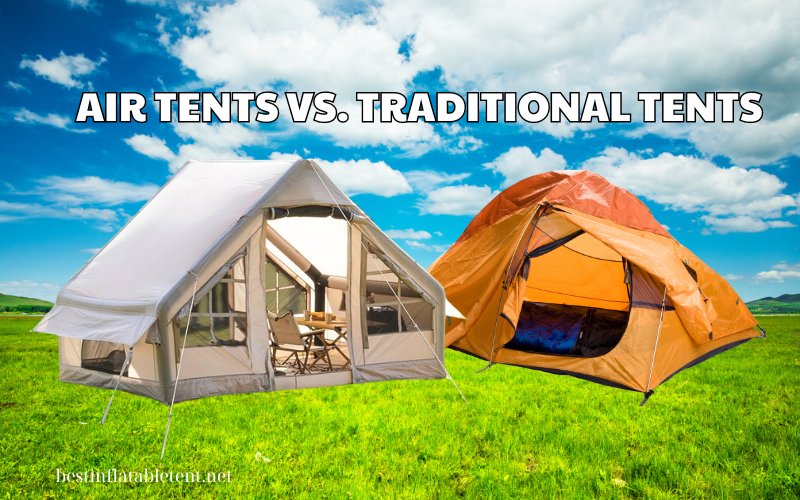Air tents and traditional tents cater to varied camping styles, each with unique benefits. Air tents, or inflatable tents, are favored for their quick setup, utilizing inflatable beams that are easily pumped up, reducing assembly time significantly. This makes air tents ideal for campers who prioritize convenience and speed in their camping setup.
On the other hand, traditional tents rely on a pole-based structure, known for their stability and durability across diverse weather conditions. They offer a broader variety of styles and are preferred by those who value robustness and the traditional camping experience.
Choosing between an air tent and a traditional tent depends on individual preferences, whether speed and ease or stability and variety hold more value for the camper.

Key Differences Between Air Tents and Traditional Tents
Ease of Setup
One of the most significant advantages of an air tent over traditional tents is the ease of setup. Air tents utilize inflatable beams that can be pumped up in minutes, eliminating the often time-consuming process of fitting together rigid poles. This feature makes air tents particularly appealing to those who want to start their camping experience without the hassle of lengthy preparations.
Traditional tents, while sturdy, generally require more time and effort to pitch, as they involve assembling a framework of poles that must be correctly aligned and secured.
Comfort and Space
When it comes to comfort and space, air tents often offer a more spacious interior due to their design. The lack of rigid poles allows for more flexible, often larger, living areas within the tent. This can make these tents feel more open and less claustrophobic, providing a comfortable environment for relaxation and sleep.
Traditional tents, depending on their design, can also be spacious but might have more obstructions or segmented spaces due to the pole structures, which can sometimes limit the usable interior space.
Durability and Weather Resistance
Traditional tents are typically known for their durability and superior weather resistance. The materials used and the structural integrity provided by the poles make these tents robust against various weather conditions, including strong winds and heavy rain.
Air tents, while improving in durability with advances in material technology, can sometimes be more vulnerable to punctures and wear due to their inflatable nature.
However, many modern air tents are designed to be highly weather-resistant, incorporating reinforced materials and weatherproof coatings to enhance their resilience.
Pros and Cons of Air Tents and Traditional Tents
Air Tents
| Pros | Offer rapid setup, excellent interior space, and a lightweight design, making them ideal for campers who prioritize convenience and ease. |
| Cons | Susceptible to punctures and generally come at a higher cost compared to traditional tents, posing potential drawbacks for rugged use and budget-conscious buyers. |
Traditional Tents
| Pros | Known for robust durability, superior weather resistance, and affordability, appealing to campers who need reliability across various environments. |
| Cons | The setup process for traditional tents can be labor-intensive and time-consuming, with a bulkier pack size, which may deter campers seeking quick deployment and easy transport. |
Cost Comparison
Initial Purchase Price
When comparing the initial purchase price, air tents typically command a higher price tag than traditional tents. This is due to their advanced technology and the materials required for the inflatable structure. While you can find entry-level air tents, they are generally more expensive than their traditional counterparts, which can range widely in price based on size, material, and brand.
Long-Term Value
Despite the higher upfront cost, the long-term value can be quite beneficial. Their ease of setup and portability often translate to more frequent use, potentially offering greater value over time for those who camp regularly. Additionally, with proper care, it’s can last just as long as traditional tents, though any repairs needed for air tents might be more costly due to their specialized materials.
Traditional tents, while initially more affordable, may require more frequent replacements or repairs if used under harsh conditions, potentially reducing their long-term value.

Which Tent Is Right for Your Camping Needs?
Considerations for Family Campers
For family campers, space and comfort are often top priorities. Air tents are particularly well-suited for families because they offer quick setups and more spacious interiors without the obstruction of poles. This means more room for sleeping arrangements and indoor activities.
The ease of setting up this tent also means less time spent on camp setup and more time for family fun.
However, families should consider the durability and weather resistance of air tents, especially if camping in varied conditions.
Recommendations for Solo Travelers
Solo travelers often prioritize ease of transport and setup, making air tents a great option due to their lightweight nature and simplicity. The quick setup allows solo campers to move faster and more efficiently, spending less time on camp preparations and more on activities or rest.
Traditional tents can also be a good choice for solo travelers who frequent rugged terrains or harsh conditions, as they generally offer better durability and protection against the elements at a lower cost point.
Conclusion
Both air tents and traditional tents have their unique benefits and limitations. Air tents offer unmatched ease of setup and spacious comfort, making them ideal for those who value convenience and quick deployment. Traditional tents, known for their durability and cost-effectiveness, are better suited for rugged environments and budget-conscious campers. Ultimately, the choice between an air tent and a traditional tent should align with your specific camping needs and preferences.
For more insights and to find the perfect air tent for your next adventure, visit our comprehensive guide at Top 9 Best Inflatable Tents.

I’m on the fence about getting an air tent. This blog post helped me weigh the pros and cons of air tents vs. traditional tents.
This is a great breakdown of the differences between air tents and traditional tents. Now I know which one is the better fit for my needs.
Thanks for the information! I think an air tent would be perfect for my next camping trip. Now I’m excited to start shopping for one!